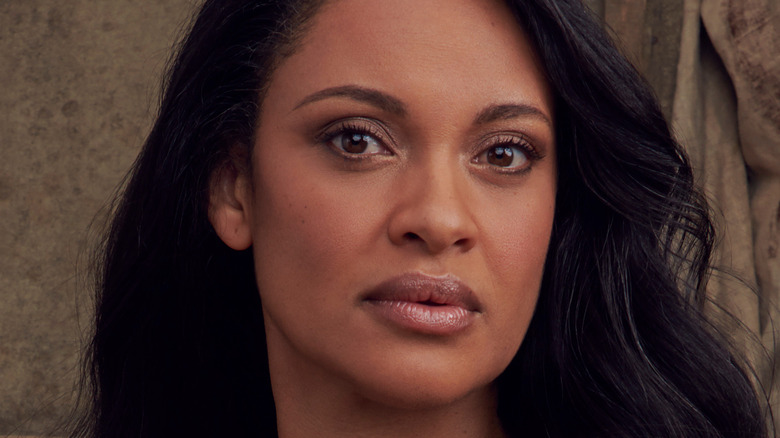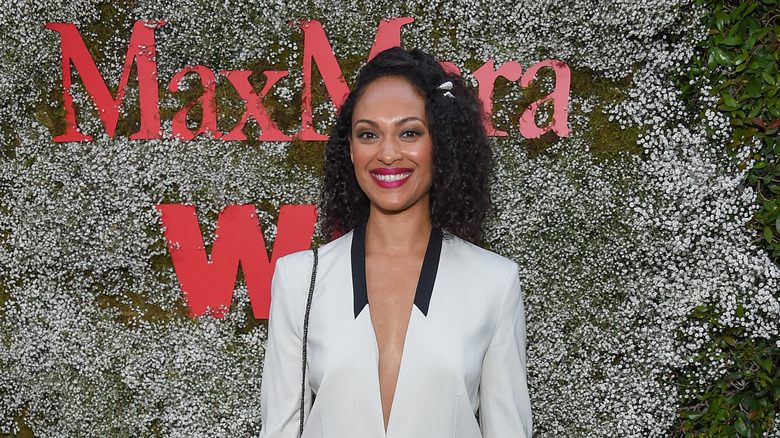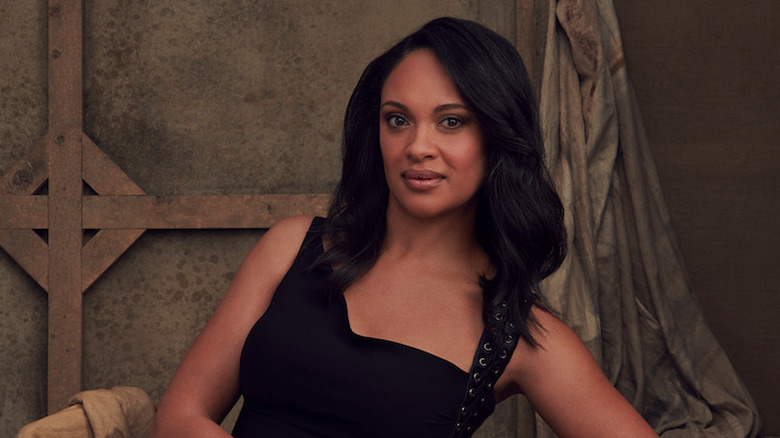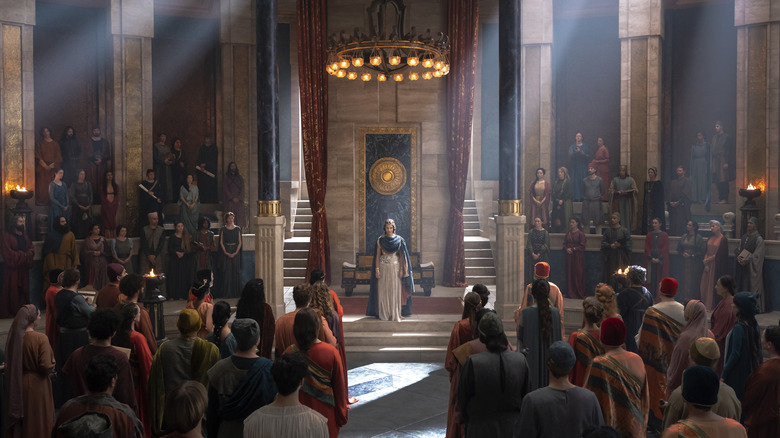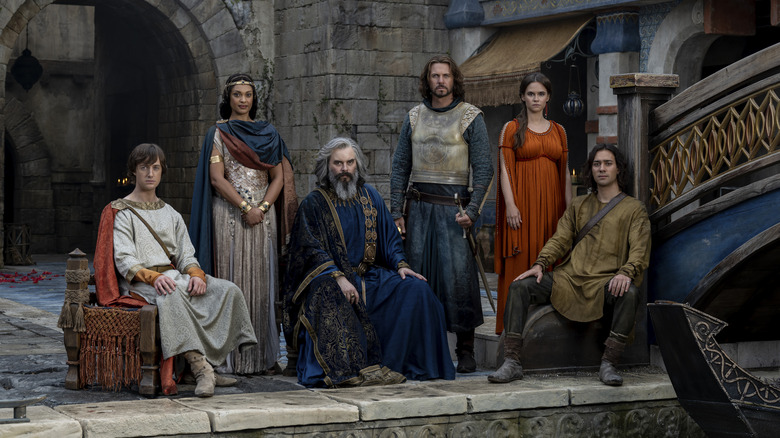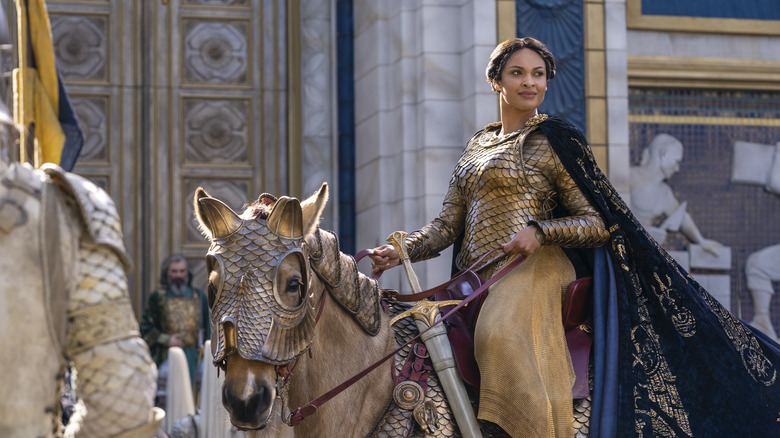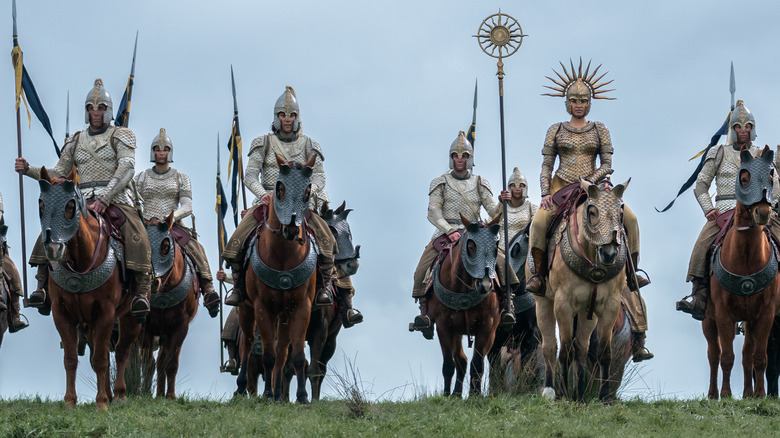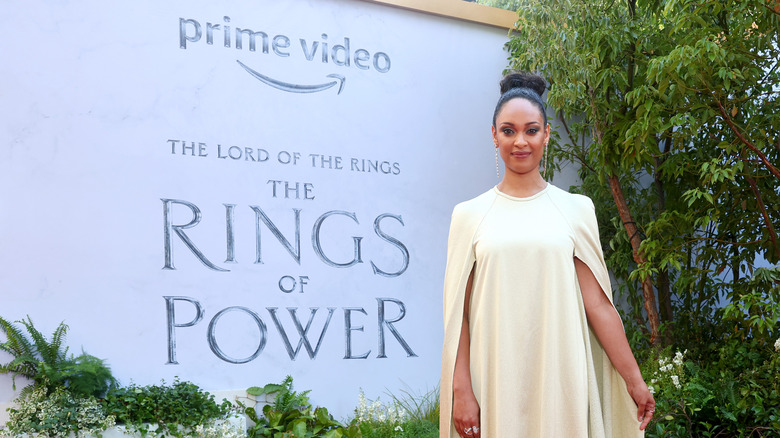Cynthia Addai-Robinson On Playing A Númenórean Queen In The Rings Of Power - Exclusive Interview
This article contains mild spoilers for "The Rings of Power" Episode 4.
Númenor is one of the most important areas in "The Lord of the Rings: The Rings of Power" story. Appearing for the first time on screen in Prime Video's adaptation, the star-shaped island nation is already a well-defined part of Middle-earth by the time Galadriel and Halbrand arrive on its shores. In fact, the nation, which was once friendly to Elves, has already reached the zenith of its power and is in the midst of a politically fractured descent. It's a charged scenario that Númenor's Queen Regent, Míriel, is desperately trying to manage, even as she grapples with palantir-induced visions of the future destruction of her realm.
The entire scenario makes Míriel a deeply complex and challenging character to portray successfully. Yet that's precisely what Cynthia Addai-Robinson has managed to do. The English-born, American-raised actress has brought a deep sense of introspection and inner turmoil to Míriel, adding a profound layer of interest to the fates of both the royal and her kingdom.
We had a chance to sit down for an extended conversation with Cynthia just before Episode 4, "The Great Wave," premiered. After starting with some fun facts about her earliest acting role and her upcoming rom-com, "The People We Hate at the Wedding," we dove headlong into her character and what it's been like bringing Míriel to life on the silver screen.
Cynthia's first leading role was Annie in high school
We have it on good authority that you played Annie in high school. First off, is that correct? Second, how did it help shape your future acting career?
That is, in fact, correct. Very proudly, that was my first leading role. I remember at the time — this was in high school — my budding amateur career, which basically only involved school productions. I was not a child actor professionally. But there was that sense, especially when you're a teenager, that you want to do things that feel artistic and tasteful and highbrow.
When we found out we were doing "Annie," we were all annoyed. "This is a children's musical. We are thespians. We are serious actors." But what was lovely for me, thinking back on it, is that not only did it embolden me to literally take center stage — which was not necessarily something that I felt like I could do in my life — but it gave me the realization that as a performer you have this very influential role in bringing joy to people. As a teenager, and especially during that time in your life when it's all up and down and chaotic in your teenage years, to do something and have that realization in real-time of, "Oh, this is something that people are clapping and singing and laughing" ...
I literally then became known as Annie for the rest of my high school experience. Even when people didn't know my real name, they'd yell it to me in the hallway. To this day, there are still people that remember that. That shows you the power of performance, that it can stay with you. Not that I think that my years-old version of Annie has that level of power, but there was something that clicked for me where it felt like maybe this is something I could actually pursue in a serious way.
Jumping genres for The People We Hate at the Wedding
You're also going to be starring in an upcoming comedy called "The People We Hate at the Wedding," along with Kristen Bell, Allison Janney, and Ben Platt. It's a bit of a deviation from your more epic and dramatic roles that we've seen you in. What can folks look forward to with this one as far as the entertainment factor goes?
I am really excited to finally get an opportunity to step into a role that feels like it's very different from anything I've ever done. I've played in a lot of genre projects, I've done a lot of more serious roles, and I haven't been asked to do something that has a lightness in tone, both for the character and for the story — or at least, it's been a very, very long time.
Additionally, what's been a lovely full circle moment personally [is that] I was born in London, but I left at a very young age. As you can tell by the sound of my voice, I grew up in the U.S. But this film is the first time I got a chance to work in London and also to basically play a character who is British. There's something that I find endlessly fascinating — it's true for "Rings of Power" as well — around dialect and how dialect factors into character or how people perceive you. I find it endlessly fascinating, especially when it comes to British accents, because I have definitely noticed a difference in how people relate to me when I sound that way.
For both "Rings of Power" and for "The People We Hate at the Wedding," I maintained my accent throughout. It wasn't like Lady Gaga levels; it wasn't home alone with an accent. But pretty much any time I was at work, that was the sound that I would maintain. It's an interesting experiment once people hear your real voice and are a bit taken aback like, "Oh."
But "The People We Hate at the Wedding," I'm very excited about. Getting the opportunity to work with Allison and Kristen and Ben and have those amazing actors be my family in the movie was a nice change of pace from coming out of "Rings" and shifting into something entirely different. Now, having both of these stories and roles get the chance to be out there, I'm happy that it feels like a bit of a departure from things I've done in the past.
Filling in gaps and mining the source material
I will drag you back into "Rings" for a minute, because I have a few questions about your character. We've seen a lot more of Míriel in Episode 3 and quite a bit more in Episode 4. We're going to see more of her, and there isn't a lot in Tolkien's writings about Tar-Míriel. What has it been like coming up with the details required to fill in things like making her relatable and giving her a story arc, knowing that you have that structure there but that there aren't a lot of details to fill it in?
I definitely tried as much as possible to do my due diligence and see what sort of details there were available in terms of the writing, not just specific to the character of Míriel but the larger world of Númenor, Pharazôn, and trying to take that information to then come up with an approach in terms of "How do I portray this person?" One of my approaches [was that] I thought a lot about her lineage. I've thought a lot about, "What does it mean to be in a line and know from birth you're going to be raised to one day lead as queen; what might that upbringing be like?"
Also, [there's] the awareness of the king and during his time of rule, what the response was to some of the decisions that he made for Númenórean society and how that would influence the type of leader that she would want to be. It was interesting because there's so much to mine. What's really exciting about Númenor is as the story continues, there's a lot of opportunity there for some interesting and complex storytelling within a society and what direction a society takes and what the implications are for the greater good.
Some of those ideas can be a bit abstract. For me, it was more about Míriel's state of mind and state of emotions in the scenario that she finds herself in. I constantly went back to that idea of the isolation around having knowledge that other people don't have and being tasked with making decisions that are hers and hers alone, in a way. She's the ultimate decider of things ... Not only are there not many people she can necessarily discuss with or go to, including her king and including Pharazôn, but there is that sense of heaviness internally, the weight of thinking about all of that and trying to decide what she can say, what she shouldn't say, what she should reveal, what steps she should take, especially once Galadriel arrives. Her arrival is the kickoff for that sense of something has begun.
Figuring out on-set dynamics and reacting in real time
One of the little pieces of information we do have on her is that Tolkien went back and forth about her role in the story, and she's a protagonist in "The Silmarillion"; she's a good guy. But in the book "The Peoples of Middle-Earth," there's an alternate version where ... she's an antagonist. Without giving too much away, let's say she goes more with Pharazôn's side of things. It even says at one point, "Her eyes and her heart were turned to him." Have these dissonant versions that Tolkien wrestled with influenced any of how you've come up with Míriel's character with "Rings of Power," or have you stayed more with the mainline version?
I wouldn't want to say too much to give a sense of where the direction of things go, at least in this first season. Some of that burden lies more on [showrunners] J.D. [Payne] and Patrick [McKay] and the writers, because they're having to make choices as far as the story arcs that will still lead to the ultimate final destination of the downfall of Númenor, because ... there are certain things that they can't stray from. What happens from point A to point B and the decisions that are made, both from the creatives and then myself as well as the directors, who also very much had a hand in shaping the performance and the tone of some of these scenes ...
I was very much in real-time trying to learn who this woman was. You can do all of the homework, as it were. But then you're standing there in the setting with the costume, with a crown on your head and about to utter your first lines, and you're trying to have that sense of "Who is this person?" Now here I am, both as the actor and as the character, standing in this courtroom or at the docks. You've done all this preparation, but there's still that moment, that reality, of you, in real-time, reacting to the people and the things that are happening in front of you. For all that preparation, I didn't want to be coming from too studied [or] too mannered of a place. It's something where you can do all of this reading, but this is still about the dynamics between people and reacting to the situations that are happening in front of you.
Míriel's age isn't specified, but she's been preparing for this moment
As far as influencing the character, a simpler question that has been bugging me is, do we know how old Míriel is at this point? Aragorn is 80 in "The Lord of the Rings," Elros lives to be 500, and I feel like those older ages impact the way you approach statesmanship. Is Míriel young, or is she older at this point, or do we not know?
It's never stated. I don't believe you're going to hear a particular referral to anyone's age in the story. [With] Númenórean lifespan, you could go to 200 years old. I want to say that she's in her 80s. Age is relative in terms of [whether] you say she's young or old — it's all relative to your lifespan.
But what I do find interesting that's related to age is she has had this life, up until the point of her regency, where it's all about preparing for the moment. Obviously, you're not necessarily going to have a sense as you move through life of when that moment happens. I don't want to speak too much on age in relation to other characters because things can get a little bit sticky with the time compression and things that they had to do. I'm not thinking about her in regards to her age as much as I am to this scenario of the king [being] towards the end of his life. She has that understanding that she is about to step into that role soon enough.
On differentiating Míriel from her father and wanting the best for her people
Númenor has been a peaceful nation for a long time at this point, and those Orcs that we've been watching are pretty terrifying. Do you think Míriel's people are ready to fight them, and will she herself be ready to lead them?
This is one of those moments where again, you see a leader, you see that shift where you've been preparing your whole life for this moment. In that sense, she's ready because she's been groomed to be ready when the moment comes. As far as Númenóreans and their willingness, I don't want to speak too much on [that] because that might get a bit spoiler-y.
Part of what she's navigating is that sense that there is a hesitation or a wariness from the public about her ability or her position. A lot of that is the baggage from her father, the king. She's very much trying to differentiate herself and her leadership from his reign to maintain stability, knowing that if she were to go too far in any direction, she's already seen what happens when you do that.
Through her father?
Yes, exactly. There's something to that idea of trying to be in the middle, exist in the middle. But having said that, there are too many signs and too many things happening [where] at a certain point, you've got to definitively make a choice.
We see some of that starting at the end of Episode 4, right?
For sure. That to me is the meatiest part of this world — seeing a society that is at this turning point and hearing the arguments, as it were, that justify one direction versus the other. Both arguments make sense. As a viewer, you would hear different people explaining their take on which way they think Númenórean society should go, and it would make sense and resonate. But for her, there is that genuine desire to do what is best for her people and not necessarily knowing what that is.
Cynthia hasn't seen past Episode 4
I know we're halfway through the first season, and I'm excited to see the second half that we've been building to. The fact that it's just the beginning of five seasons is also awesome.
Yeah. It's even interesting to hear you say halfway, because it's like, "Oh, wow." We've definitely established and laid out quite a bit in terms of the worlds and the characters, and we have to get into the meat of things very quickly. But I also am excited to see the latter half of the season because I'm going to be watching along with everyone else. I'm excited to see how it all plays out, even though I do know for the most part where things are set right now.
That's got to be exciting too. When it all comes together, it's so awe-inspiring. At the red carpet event, a lot of the actors were talking about how seeing it all come together really is different ... You can know everything about it behind the scenes, but you cannot picture that final product until you see it.
Absolutely. It's very much a testament to all the people who do their magic in post — the editors, the score, the musicians who play the score, the special effects, which you're staring at something and then you see it in its end result, and it's truly magical. My hat is off to all those people because oftentimes we don't get to meet those people as actors. We're quite removed from the post-production part of it all. They're equally as important.
New episodes of the eight-episode first season of "The Lord of the Rings: The Rings of Power" drop Fridays at 12:00 a.m. ET on Prime Video.
This interview was edited for clarity.
